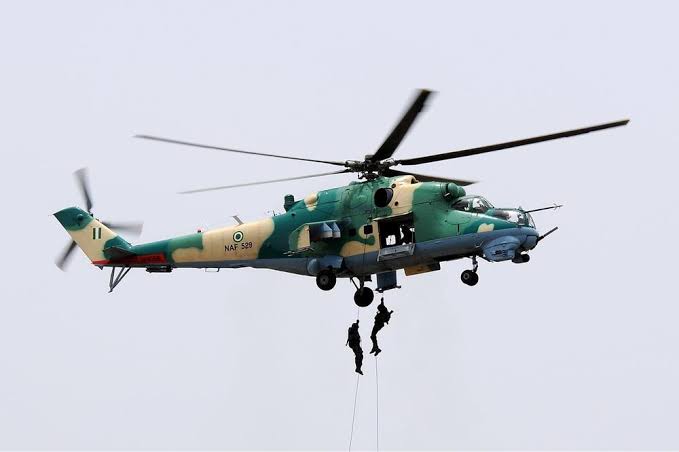The Nigerian Air Force (NAF) has significantly ramped up its operational capacity in the North-Central region by deploying additional air assets to Benue, Nasarawa, and Taraba states under Operation Whirl Stroke (OPWS). This strategic move, announced on June 17, 2025, responds to escalating violence perpetrated by bandits, militia groups, and kidnappers targeting rural communities. The deployment aims to enhance aerial surveillance, provide real-time intelligence, and deliver precision strikes to neutralize threats and restore stability in the affected areas.
The decision follows a surge in criminal activities, notably the devastating attack in Yelwata, Benue State, where over 200 lives were lost to militia violence. Air Marshal Hasan Bala Abubakar, the Chief of the Air Staff, conducted an operational assessment in Makurdi, the Benue State capital, to evaluate the NAF’s contributions to OPWS. His visit underscored the Air Force’s critical role in supporting ground forces through close air support, armed reconnaissance, and targeted airstrikes, which have already dismantled several militia camps and criminal hideouts across the three states.
Operation Whirl Stroke, a joint military task force, integrates efforts from the NAF, Nigerian Army, Navy, and other security agencies to address insecurity in the Middle Belt. The additional aircraft, including attack helicopters and fighter jets, are equipped with advanced surveillance systems to monitor remote areas where criminals exploit difficult terrain. These air assets enable rapid response to distress calls, disrupt supply chains of illegal arms, and provide cover for ground troops engaged in counter-insurgency operations.
The NAF’s enhanced presence is part of a broader strategy to curb the proliferation of banditry and kidnapping, which have displaced thousands and disrupted agricultural activities in the region. In Nasarawa, for instance, aerial operations have targeted enclaves used by bandits to launch attacks on farming communities, while in Taraba, airstrikes have disrupted cattle rustling networks linked to militia groups. The Air Force’s intelligence, surveillance, and reconnaissance (ISR) capabilities have proven vital in identifying high-value targets and coordinating with ground forces for effective operations.
Air Marshal Abubakar emphasized the importance of inter-agency collaboration during his briefing in Makurdi, commending the synergy between the NAF and other security outfits. He noted that the Air Force’s operations are guided by precise intelligence to minimize collateral damage while maximizing impact against criminal elements. The deployment also includes logistical support to ensure sustained operations, with maintenance crews and fuel supplies positioned to keep aircraft operational round-the-clock.
The recent violence in Benue, particularly in Gwer West, Logo and Guma local government areas, has heightened the urgency of these operations. The NAF’s air campaigns have already yielded results, with several militia leaders neutralized and their operational bases destroyed. However, challenges remain, including the need for sustained funding, improved community intelligence, and addressing the root causes of insecurity, such as unemployment and land disputes.
Community leaders in the affected states have welcomed the NAF’s intervention but called for complementary efforts to protect vulnerable populations. In Taraba, local stakeholders have urged the military to extend aerial patrols to border areas with Cameroon, where criminals often retreat after attacks. Similarly, in Nasarawa, residents have advocated for increased ground troop deployment to consolidate gains made through air operations.
The NAF’s commitment extends beyond combat operations, with plans to engage communities through civil-military initiatives like medical outreaches and infrastructure support. These efforts aim to rebuild trust and foster cooperation, which is critical for gathering actionable intelligence. Air Marshal Abubakar reiterated that the NAF would continue to adapt its strategies to counter evolving threats, ensuring that the Air Force remains a decisive factor in restoring peace to the region.




